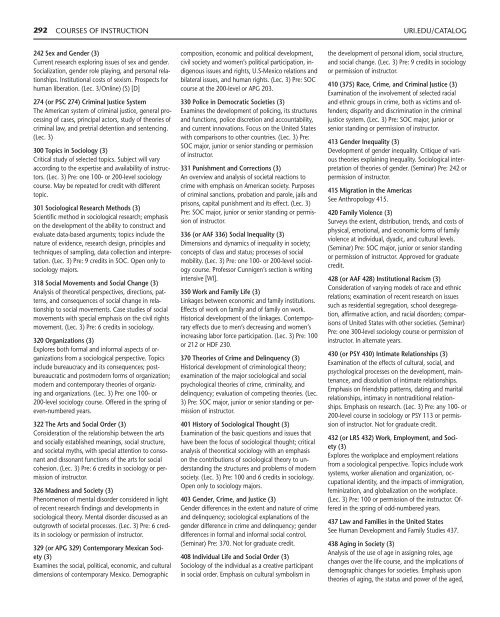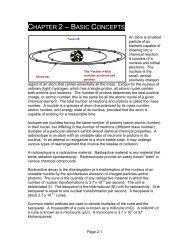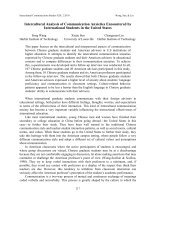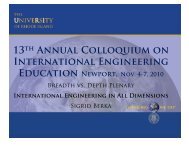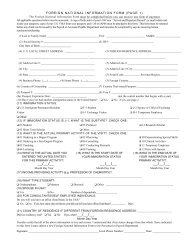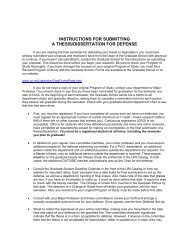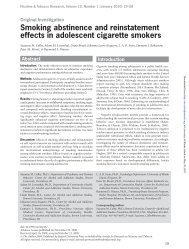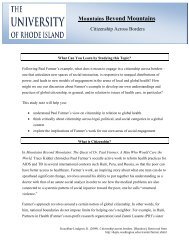UNDERGRADUATE PROGRAMS The - University of Rhode Island
UNDERGRADUATE PROGRAMS The - University of Rhode Island
UNDERGRADUATE PROGRAMS The - University of Rhode Island
Create successful ePaper yourself
Turn your PDF publications into a flip-book with our unique Google optimized e-Paper software.
292 COURSES OF INSTRUCTION URI.EDU/CATALOG<br />
242 Sex and Gender (3)<br />
Current research exploring issues <strong>of</strong> sex and gender.<br />
Socialization, gender role playing, and personal relationships.<br />
Institutional costs <strong>of</strong> sexism. Prospects for<br />
human liberation. (Lec. 3/Online) (S) [D]<br />
274 (or PSC 274) Criminal Justice System<br />
<strong>The</strong> American system <strong>of</strong> criminal justice, general processing<br />
<strong>of</strong> cases, principal actors, study <strong>of</strong> theories <strong>of</strong><br />
criminal law, and pretrial detention and sentencing.<br />
(Lec. 3)<br />
300 Topics in Sociology (3)<br />
Critical study <strong>of</strong> selected topics. Subject will vary<br />
according to the expertise and availability <strong>of</strong> instructors.<br />
(Lec. 3) Pre: one 100- or 200-level sociology<br />
course. May be repeated for credit with different<br />
topic.<br />
301 Sociological Research Methods (3)<br />
Scientific method in sociological research; emphasis<br />
on the development <strong>of</strong> the ability to construct and<br />
evaluate data-based arguments; topics include the<br />
nature <strong>of</strong> evidence, research design, principles and<br />
techniques <strong>of</strong> sampling, data collection and interpretation.<br />
(Lec. 3) Pre: 9 credits in SOC. Open only to<br />
sociology majors.<br />
318 Social Movements and Social Change (3)<br />
Analysis <strong>of</strong> theoretical perspectives, directions, patterns,<br />
and consequences <strong>of</strong> social change in relationship<br />
to social movements. Case studies <strong>of</strong> social<br />
movements with special emphasis on the civil rights<br />
movement. (Lec. 3) Pre: 6 credits in sociology.<br />
320 Organizations (3)<br />
Explores both formal and informal aspects <strong>of</strong> organizations<br />
from a sociological perspective. Topics<br />
include bureaucracy and its consequences; postbureaucratic<br />
and postmodern forms <strong>of</strong> organization;<br />
modern and contemporary theories <strong>of</strong> organizing<br />
and organizations. (Lec. 3) Pre: one 100- or<br />
200-level sociology course. Offered in the spring <strong>of</strong><br />
even-numbered years.<br />
322 <strong>The</strong> Arts and Social Order (3)<br />
Consideration <strong>of</strong> the relationship between the arts<br />
and socially established meanings, social structure,<br />
and societal myths, with special attention to consonant<br />
and dissonant functions <strong>of</strong> the arts for social<br />
cohesion. (Lec. 3) Pre: 6 credits in sociology or permission<br />
<strong>of</strong> instructor.<br />
326 Madness and Society (3)<br />
Phenomenon <strong>of</strong> mental disorder considered in light<br />
<strong>of</strong> recent research findings and developments in<br />
sociological theory. Mental disorder discussed as an<br />
outgrowth <strong>of</strong> societal processes. (Lec. 3) Pre: 6 credits<br />
in sociology or permission <strong>of</strong> instructor.<br />
329 (or APG 329) Contemporary Mexican Society<br />
(3)<br />
Examines the social, political, economic, and cultural<br />
dimensions <strong>of</strong> contemporary Mexico. Demographic<br />
composition, economic and political development,<br />
civil society and women’s political participation, indigenous<br />
issues and rights, U.S-Mexico relations and<br />
bilateral issues, and human rights. (Lec. 3) Pre: SOC<br />
course at the 200-level or APG 203.<br />
330 Police in Democratic Societies (3)<br />
Examines the development <strong>of</strong> policing, its structures<br />
and functions, police discretion and accountability,<br />
and current innovations. Focus on the United States<br />
with comparisons to other countries. (Lec. 3) Pre:<br />
SOC major, junior or senior standing or permission<br />
<strong>of</strong> instructor.<br />
331 Punishment and Corrections (3)<br />
An overview and analysis <strong>of</strong> societal reactions to<br />
crime with emphasis on American society. Purposes<br />
<strong>of</strong> criminal sanctions, probation and parole, jails and<br />
prisons, capital punishment and its effect. (Lec. 3)<br />
Pre: SOC major, junior or senior standing or permission<br />
<strong>of</strong> instructor.<br />
336 (or AAF 336) Social Inequality (3)<br />
Dimensions and dynamics <strong>of</strong> inequality in society;<br />
concepts <strong>of</strong> class and status; processes <strong>of</strong> social<br />
mobility. (Lec. 3) Pre: one 100- or 200-level sociology<br />
course. Pr<strong>of</strong>essor Cunnigen’s section is writing<br />
intensive [WI].<br />
350 Work and Family Life (3)<br />
Linkages between economic and family institutions.<br />
Effects <strong>of</strong> work on family and <strong>of</strong> family on work.<br />
Historical development <strong>of</strong> the linkages. Contemporary<br />
effects due to men’s decreasing and women’s<br />
increasing labor force participation. (Lec. 3) Pre: 100<br />
or 212 or HDF 230.<br />
370 <strong>The</strong>ories <strong>of</strong> Crime and Delinquency (3)<br />
Historical development <strong>of</strong> criminological theory;<br />
examination <strong>of</strong> the major sociological and social<br />
psychological theories <strong>of</strong> crime, criminality, and<br />
delinquency; evaluation <strong>of</strong> competing theories. (Lec.<br />
3) Pre: SOC major, junior or senior standing or permission<br />
<strong>of</strong> instructor.<br />
401 History <strong>of</strong> Sociological Thought (3)<br />
Examination <strong>of</strong> the basic questions and issues that<br />
have been the focus <strong>of</strong> sociological thought; critical<br />
analysis <strong>of</strong> theoretical sociology with an emphasis<br />
on the contributions <strong>of</strong> sociological theory to understanding<br />
the structures and problems <strong>of</strong> modern<br />
society. (Lec. 3) Pre: 100 and 6 credits in sociology.<br />
Open only to sociology majors.<br />
403 Gender, Crime, and Justice (3)<br />
Gender differences in the extent and nature <strong>of</strong> crime<br />
and delinquency; sociological explanations <strong>of</strong> the<br />
gender difference in crime and delinquency; gender<br />
differences in formal and informal social control.<br />
(Seminar) Pre: 370. Not for graduate credit.<br />
408 Individual Life and Social Order (3)<br />
Sociology <strong>of</strong> the individual as a creative participant<br />
in social order. Emphasis on cultural symbolism in<br />
the development <strong>of</strong> personal idiom, social structure,<br />
and social change. (Lec. 3) Pre: 9 credits in sociology<br />
or permission <strong>of</strong> instructor.<br />
410 (375) Race, Crime, and Criminal Justice (3)<br />
Examination <strong>of</strong> the involvement <strong>of</strong> selected racial<br />
and ethnic groups in crime, both as victims and <strong>of</strong>fenders;<br />
disparity and discrimination in the criminal<br />
justice system. (Lec. 3) Pre: SOC major, junior or<br />
senior standing or permission <strong>of</strong> instructor.<br />
413 Gender Inequality (3)<br />
Development <strong>of</strong> gender inequality. Critique <strong>of</strong> various<br />
theories explaining inequality. Sociological interpretation<br />
<strong>of</strong> theories <strong>of</strong> gender. (Seminar) Pre: 242 or<br />
permission <strong>of</strong> instructor.<br />
415 Migration in the Americas<br />
See Anthropology 415.<br />
420 Family Violence (3)<br />
Surveys the extent, distribution, trends, and costs <strong>of</strong><br />
physical, emotional, and economic forms <strong>of</strong> family<br />
violence at individual, dyadic, and cultural levels.<br />
(Seminar) Pre: SOC major, junior or senior standing<br />
or permission <strong>of</strong> instructor. Approved for graduate<br />
credit.<br />
428 (or AAF 428) Institutional Racism (3)<br />
Consideration <strong>of</strong> varying models <strong>of</strong> race and ethnic<br />
relations; examination <strong>of</strong> recent research on issues<br />
such as residential segregation, school desegregation,<br />
affirmative action, and racial disorders; comparisons<br />
<strong>of</strong> United States with other societies. (Seminar)<br />
Pre: one 300-level sociology course or permission <strong>of</strong><br />
instructor. In alternate years.<br />
430 (or PSY 430) Intimate Relationships (3)<br />
Examination <strong>of</strong> the effects <strong>of</strong> cultural, social, and<br />
psychological processes on the development, maintenance,<br />
and dissolution <strong>of</strong> intimate relationships.<br />
Emphasis on friendship patterns, dating and marital<br />
relationships, intimacy in nontraditional relationships.<br />
Emphasis on research. (Lec. 3) Pre: any 100- or<br />
200-level course in sociology or PSY 113 or permission<br />
<strong>of</strong> instructor. Not for graduate credit.<br />
432 (or LRS 432) Work, Employment, and Society<br />
(3)<br />
Explores the workplace and employment relations<br />
from a sociological perspective. Topics include work<br />
systems, worker alienation and organization, occupational<br />
identity, and the impacts <strong>of</strong> immigration,<br />
feminization, and globalization on the workplace.<br />
(Lec. 3) Pre: 100 or permission <strong>of</strong> the instructor. Offered<br />
in the spring <strong>of</strong> odd-numbered years.<br />
437 Law and Families in the United States<br />
See Human Development and Family Studies 437.<br />
438 Aging in Society (3)<br />
Analysis <strong>of</strong> the use <strong>of</strong> age in assigning roles, age<br />
changes over the life course, and the implications <strong>of</strong><br />
demographic changes for societies. Emphasis upon<br />
theories <strong>of</strong> aging, the status and power <strong>of</strong> the aged,


